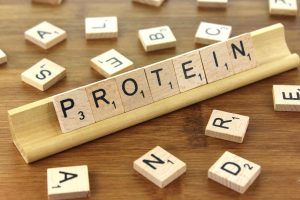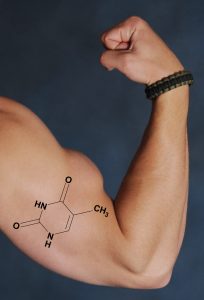Sam is stuck in a rut. She trains six days a week but she’s not getting any stronger, she hasn’t gained any muscle, and her weight hasn’t budged.
What is this self-proclaimed “gym rat” to do?
Simple. Eat more protein.
Except it’s not so easy if you don’t know exactly how much you need for your specific goals.
Read on, and you will!
What is Protein, and Why Do You Need It?

Protein is essential for many of the body’s processes (Photo: by Nick Youngson CC BY-SA 3.0 Alpha Stock Images)
A fundamental building block of the body, protein is a compound comprised of chains of smaller molecules called amino acids. Your body produces some, but you need to feed yourself the rest to nurture muscles, enzymes, hormones, and neurotransmitters.
Because protein is hard to break down, it takes more calories to digest it (i.e., eat more, burn more). As you can imagine, an exercise fiend like our friend Sam needs more protein, but sedentary folks need an adequate amount as well. Without it, you lose muscle faster as you age, and your body ages even faster.
You don’t have to stuff yourself silly with salmon, steak, or shakes to get the right amount of protein. But you’ll want to read on to be sure you’re getting the right amount.
How much protein is necessary to control hunger?
There’s nothing like a stomach grumble to break the silence in the room, but if you’re always hungry, this may happen more often than you’d like. Protein can help. Research shows that a high-protein diet can control hunger and reduce your overall appetite—possibly by increasing leptin levels, which “turns off” hunger, and helping you feel fuller from the food you eat. But just how much does it take to do this? Studies show that eating 30 grams of protein at each meal will keep the average person satisfied.
How much protein do you need to prevent muscle loss?
Your goal when dieting is to make sure your body “eats” as much fat and as little muscle as possible. But the more calories you cut, the more your body tries to consume that precious muscle. Increasing protein can help prevent this to a point, but cut your calories too much and you’re bound to lose muscle mass.

To maintain health and muscle mass, aim for 0.36 grams of protein per pound. (Photo: U.S. Air Force/Senior Airman Katrina Heikkinen)
If you’re a healthy adult 19 or older, the recommended dietary allowance (RDA) for protein to maintain health and muscle mass is 0.8 grams per kilogram of body weight per day or 0.36 grams per pound. That means a sedentary 50-year-old who weighs 150 pounds should have about 54 grams of protein a day to be healthy. But that’s just the minimum amount. In a study by the American Journal of Physiology–Endocrinology and Metabolism healthy adults ages 52 to 75 who consumed 1.5 grams of protein per kilogram of body weight built and preserved more muscle than those who stuck to the 0.8 minimum.
How much protein do you need to maximize your rate of muscle mass growth?
If you’re like Sam, challenging yourself with exercise intensity and frequency, you probably need to eat more protein while dieting. Research says you should shoot for 0.73 to 0.82 grams per one pound of body weight per day to maximize protein synthesis (i.e., beef up). You could go higher than this, but it’s not going to help you gain muscle mass quicker.
It’s More Than Weight Loss and Muscle Gain
Protein has many effects on health that have nothing to do with weight or muscle. There’s growing evidence that a high-protein diet can help lower blood pressure and cholesterol levels, and build bone mass. So, Sam, along with the rest of the sedentary population, has nothing to lose by packing in the protein. (Unless that protein leads to a food allergy, but that’s another story for another blog post!)
Ready to take charge of your health? We have the tests and customized nutrition programs to help you. Get in touch.







